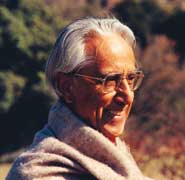




“Colligite fragmenta”. Particularity and universality
“Colligite quae superaverunt fragmenta, ne pereant (Jn 6,12). Nothing is despised, nothing is left out. Everything is integrated, accepted, transfigured… .. Think all the fragments of our present world to reunite them in a whole, not monolithic but rather harmonious” (The Cosmotheandric Experience, Madrid 1999).
“We can no longer live in sealed compartments, narcissistically satisfied with isolations that having ceased to be splendid have become miserable. ..It is a matter of the interconnectedness of all within all, as practically all the mystics emphasize” (“¿Mística comparada?”, La mística en el siglo XXI, Madrid 2002).
“God is radical relativity or total reciprocity. This is meant to underscore the character of the all with all as constitutive relation, something very distinct from a pure and simple relativism… Relativism is pessimistic and destroys any criterion of truth including its own; relativity, on the other hand, leaves the criteria of truth standing, but without absolutizing them" (El silencio del Buddha, Madrid 1996).
Faced with the reductionism so typical of Western thought, Panikkar’s principle characteristic is an obsession for the all, for arriving at reality in all its fullness, for a harmony among diverse particular realities and distinct cultural conceptions of the modern West and the East. It is a matter of approaching an authentic “vision of the whole”.
It is for this reason that particularity and universality are indissolubly linked in the life and reflection of Raimon Panikkar in the search for the interrelatedness of all with all. We cannot arrive at the whole of reality except from the concrete particular. Panikkar knows that one cannot be truly universal without being radically particular, concrete. Interconnectedness or interdependence is a fundamental element of Buddhism and other traditions.
official site